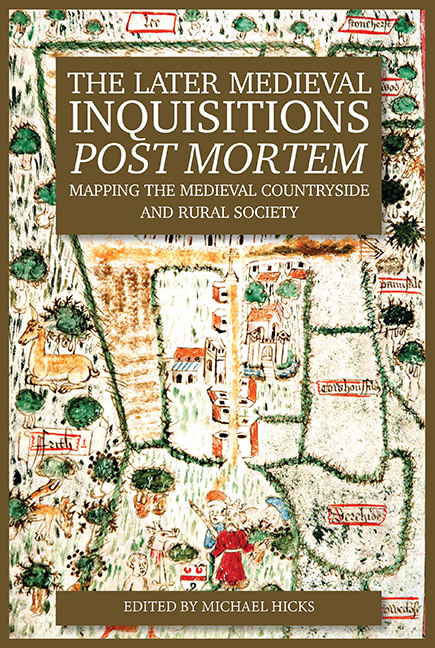Book contents
- Frontmatter
- Contents
- List of Illustrations
- List of Contributors
- Glossary
- List of Abbreviations
- 1 Introduction
- 2 Records of an Imperial Administration? Inquisitions Post Mortem in Scotland and Calais
- 3 Inquisitions Post Mortem in Medieval Ireland
- 4 The Court of the Honour of Clare, 1308–60: Feudal Incidents and Inquisitions
- 5 Landscape, Farming and Society in an English Region: The Inquisitions Post Mortem for the West Midlands, 1250–1509
- 6 Beyond the Dots: Mapping Meaning in the Later Medieval Landscape
- 7 Fairs and Markets in the Inquisitions Post Mortem
- 8 The Structure of the Milling Industry 1427–37
- 9 Proofs of Age 1246 to 1430: Their Nature, Veracity and Use as Sources
- 10 What Went On in the Medieval Parish Church, 1377–1447, with Particular Reference to Churching
- 11 Retainers, Monks and Wine: Three Insights into Everyday Life
- 12 The Administration and Efficiency of the Inquisitions Post Mortem Process: A Case Study of Northumberland
- 13 Late Medieval Land Disputes and the Manipulation of the Inquisitions Post Mortem
- Index
2 - Records of an Imperial Administration? Inquisitions Post Mortem in Scotland and Calais
Published online by Cambridge University Press: 26 May 2021
- Frontmatter
- Contents
- List of Illustrations
- List of Contributors
- Glossary
- List of Abbreviations
- 1 Introduction
- 2 Records of an Imperial Administration? Inquisitions Post Mortem in Scotland and Calais
- 3 Inquisitions Post Mortem in Medieval Ireland
- 4 The Court of the Honour of Clare, 1308–60: Feudal Incidents and Inquisitions
- 5 Landscape, Farming and Society in an English Region: The Inquisitions Post Mortem for the West Midlands, 1250–1509
- 6 Beyond the Dots: Mapping Meaning in the Later Medieval Landscape
- 7 Fairs and Markets in the Inquisitions Post Mortem
- 8 The Structure of the Milling Industry 1427–37
- 9 Proofs of Age 1246 to 1430: Their Nature, Veracity and Use as Sources
- 10 What Went On in the Medieval Parish Church, 1377–1447, with Particular Reference to Churching
- 11 Retainers, Monks and Wine: Three Insights into Everyday Life
- 12 The Administration and Efficiency of the Inquisitions Post Mortem Process: A Case Study of Northumberland
- 13 Late Medieval Land Disputes and the Manipulation of the Inquisitions Post Mortem
- Index
Summary
Inquisitions post mortem were designed to enable the king of England to keep track of his lands and feudal rights in order to exploit any potential profits or feudal incidents arising from them. Their existence and survival in themselves are a testament to the ability of English royal government throughout the Middle Ages to keep track of its lands and rights which were not confined to the area which constitutes modern-day England. Angevin kings held large swathes of territory in France, though by the fourteenth century Gascony was their only French territory. From 1171 until the Irish parliament declared that Henry VIII was king of Ireland in 1541, the king of England was also lord of Ireland. Even before Wales was conquered by Edward I, Welsh princes had performed homage to kings of England. English kings also claimed overlordship over Scotland from the Anglo- Saxon period onwards although, with the exception of the brief conquests of Edward I, this was much more of a theory or an ideal than a political reality. These claims to territory and overlordship provided the justification for numerous military campaigns during which English kings conquered parts of Scotland, France, Wales and Ireland, with varying degrees of success and endurance.
Ideologies such as the commitment to English overlordship over the rest of the British Isles could not in themselves lead to military success. Such ideologies and beliefs could provide only the initial impetus for conquests or the post hoc justification for such actions. Conquests were achieved as much by administrative capabilities as they were by military superiority and ideological concepts of overlordship. As Geoffrey Barrow observed in the context of the Edward I's conquest of Scotland:
The more one reads or handles some of the vast quantity of records left behind by this burst of imperialist activity, the more one admires the calm ambitiousness and the extraordinary thoroughness of the thirteenth-century English monarchy as it set about governing a foreign country.
Similar sentiments can be expressed for the parts of France, Wales and Ireland conquered by various English monarchs.
IPMs were integral parts of the extensive English bureaucracy, and those taken in parts of France, Scotland, Wales and Ireland from the thirteenth to the sixteenth centuries demonstrate one method by which successive English monarchs attempted to govern their newly conquered territory.
- Type
- Chapter
- Information
- The Later Medieval Inquisitions Post MortemMapping the Medieval Countryside and Rural Society, pp. 7 - 23Publisher: Boydell & BrewerPrint publication year: 2016



